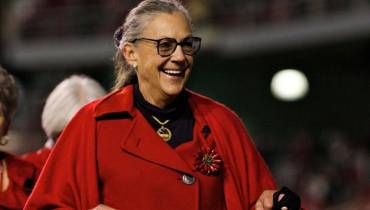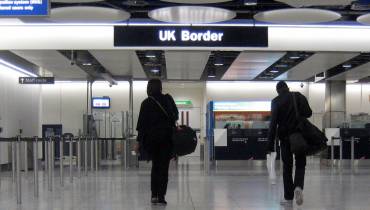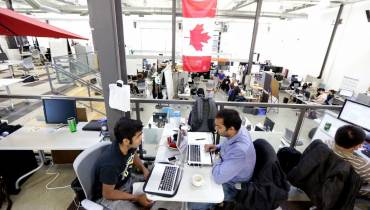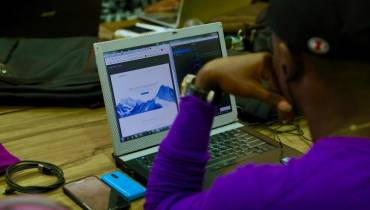UK Policies Against Refugees: The Role of Social Media in Exposing Injustice

Migrants crossing the English Channel, September 2020. Photo: picture-alliance/P. Bonniere.
The UK's Home Office has chosen to continue with ‘hostile’ policies, which at their heart are designed to make life as hard for migrants in the UK as possible; or in this case, make it as hard as possible for migrants to even reach the UK in the first place.
Such policies have been enacted with the hopes they will deter migrants from wanting to travel to and reside in the UK. However, this aim has not been achieved, with groups of migrants such as refugees and individuals seeking asylum being desperate enough to engage in dangerous practices that they believe will secure them a safe and supported life in the UK.
Recently, Priti Patel, the UK Home Secretary, urged social media platforms and companies to remove any posts that “glorify” migrant crossings. This follows an influx over the last few years in the role those social media platforms play in exposing and highlighting migrant injustices, particularly those surrounding refugees, on a large international scale.
Patel has been seen to try and deflect focus from the effects of the Home Office’s policies by arguing that social media companies are allowing channel crossings to be ‘glamourized’ in videos and photos posted on their platforms. She wrote to the firms, stating that she felt they should be doing more to remove the “totally unacceptable clips” which are promoting “lethal crossings”.
This attack was spurred on by a viral video posted on TikTok that showcased a group of men attempting to cross the channel in a dinghy, with similar content featuring on Facebook, Instagram and Twitter.
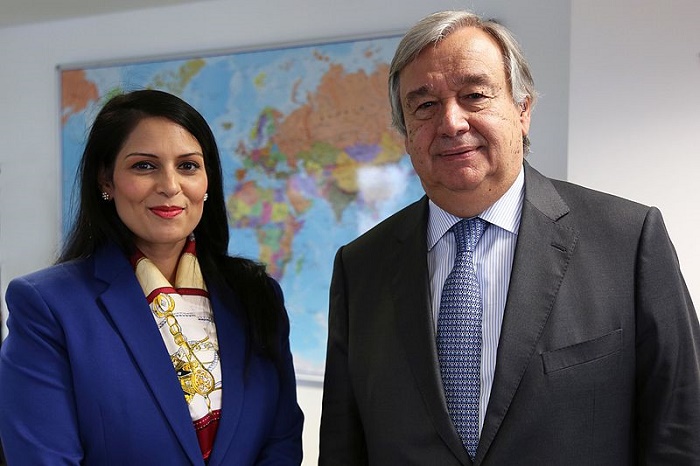
Priti Patel with the United Nations Secretary General elect Antonio Guterres at the DFID headquarters in London November 2016. Photo: Marisol Grandon/DFID
Patel’s anxieties seem incredibly misplaced, as her argument completely ignores the fact that such crossings are occurring. To some extent it seems somewhat authoritarian of her to suggest that such videos should be taken down, when dangerous crossings are taking place as a result of policies that her department are designing and enforcing.
It is not social media promoting the crossings; it is her policies. Her department are choosing to enact ‘hostile’ policies which are placing migrants in these dangerous situations, with social media simply acting as a means for people to expose the true realities of how the immigration laws are affecting some of the most vulnerable people in the world.
Minnie Rahman, the campaigns director at the Joint Council for the Welfare of Immigrants (JCWI) has commented on the issue, saying:
“Social media companies have a responsibility to keep people safe, but it is no surprise that Patel is looking to place the blame outside of the Home Office.
Patel has chosen to take a frantic, chaotic and irresponsible approach to the asylum system, which will only push desperate people further into the hands of people smugglers and traffickers, and make journeys more deadly.
The government must stop ignoring all evidence, stay committed to the refugee convention and ensure that people are able to travel to the UK safely.”
Channel crossing
The method of Channel crossing is becoming more common amongst desperate migrants. In the first four months of 2021, there were a total of 2108 people attempting to make the journey, more than double that of the first 4 months of 2020. In just a 3-day period in May 2021, nearly 600 people were intercepted trying to make the crossing.
However, often in media depictions and general public consensus, such a journey is portrayed as being voluntary and an unnecessary risk. However, as Clare Moseley, the founder of Care4Calais, has argued:
“There is nothing remotely glamourous about Channel crossings… Despite the fact that most refugees don’t choose to come to the UK, there are those who have their only remaining family here or have other connections that are strong enough to be worth risking their lives for.
In those desperate cases, the lack of a safe alternative pathways makes a dangerous trip in an unsuitable boat the only viable option.”
Instead of shifting blame, it is absolutely necessary that Priti Patel and the Home Office begin to acknowledge and take responsibility for the role their policies play in forcing migrants into incredibly dangerous and life-threatening situations.
Enver Solomon, chief executive of the Refugee Council, has weighed in and stated:
“Creating safe routes to the UK- through an expanded resettlement programme, humanitarian visas, and reforming the restrictive family reunion rules- is what the government needs to be focusing on to address the issue.”
The UK government should be viewing refugees and individuals seeking asylums as human beings, and supporting them onto the pathways they need to be on, such as indefinite leave to remain and British citizenship."
As Priti Patel put it in her letter to social media firms, “What these posts don’t mention are the people who have died trying to make this crossing, or those forced to spend 13 hours in unseaworthy boats in freezing waters.”
She may be right, but the questions she needs to be asking is what and whose policies are the ones causing the deaths?







